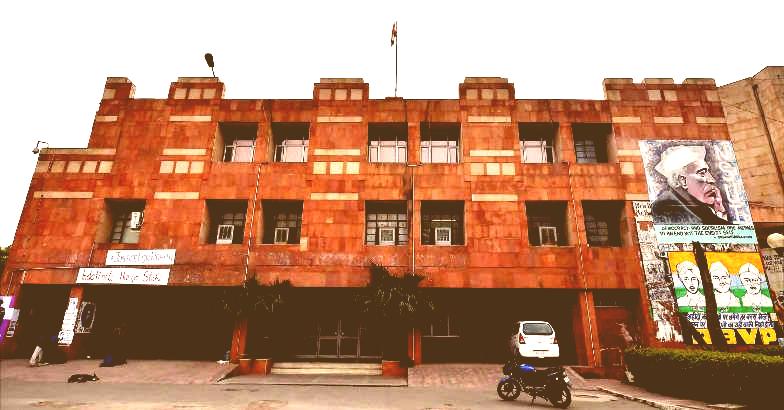The students of Jawaharlal Nehru University take pride in being different, they believe their approach to learning is ‘unique’ and what they practice is ‘vibrant political activism’. So far so good, the problem begins when they extend this brand of ‘activism’ to devise a mode of protest that is now becoming the norm in the JNU campus.
In October 2016, students protesting against, what they called, the JNU administration’s “lack of initiative and effort” to trace missing student Najeeb Ahmad, confined VC Jagadeesh Kumar and other university officials to their offices all through the night. After this incident, the High Court banned protests within 100 metres of the Administration Block.
However, on February 15, 2018, the same scene was repeated by some defiant students led by JNUSU members. Incensed by a circular making 75% attendance mandatory for availing scholarships, fellowships, hostel and other facilities, these students ‘gheraoed’ the Admin Block and prevented two Rectors and a Proctor from leaving the building. Wilfully defying the HC order that banned them from protesting outside the Admin Block, they blocked the main entrance from 11 am onwards, not allowing the university officials to step out for lunch or head for their classes.
Ignoring the High Court order that directs all peaceful protests to be held in Sabarmati Ground, they have again made the Admin block the hub of their disruptive politics. Forming a human chain around the area christened ‘Freedom Square’, the Protestors created a din by singing songs, beating drums and performing skits. Despite repeated requests for dispersal, the students refused to budge. Registrar Pramod Kumar stated that they were “protesting at the top of their voice and beating drums and obstructing the functioning of the varsity.” The JNUSU President demanded that the VC address the students and rollback the compulsory attendance condition.
The siege continued through the night and not even the deteriorating medical condition of one of the forcibly confined Rectors, made the agitationists see reason. Finally, an ambulance had to be called to rescue the patient. The rest of the ‘hostages’ were brought out by a security team.
What these student-activists call the ‘progressive and democratic’ character of JNU is fast deteriorating into a ‘Civil War’ kind of situation, where students are constantly and deliberately at loggerheads with the administration.
And somehow, it’s getting increasingly difficult to believe that these protests are either spontaneous or ‘academic’. Genuine, academically-oriented students would never allow their precious time to be wasted in organising processions, candlelight vigils or in intimidating authorities. The fact is, this premier university is being used as a training ground for recruits who hone their disruptive skills before graduating to the fine art of ‘agitational politics’ in the big bad world outside.
Two FIRs have been lodged against the JNU students for ‘wrongful confinement’ of university officials and blocking the road adjoining the Admin building, yet these ‘scholars’ feel no shame! In Delhi University and its affiliated colleges, students need a minimum of 66% attendance is required for being allowed to sit for a semester exam, Jamia requires 75% attendance for undergraduate and postgraduate courses. China’s top university Tsinghua, has rules according to which, five successive absences may lead to dismissal. At Harvard and other US universities, regular attendance at course meetings and related events is expected of all students. So what ‘model’ of higher education is this defiance of rules and regulations, derived from?
For those citing the example of underprivileged students, it would be pertinent to note that this section of students is the one which benefits most from regular classroom teaching and continued presence on campus. It is doubtful whether, left to make their own decisions, they would have any objections to the mandatory attendance.
As for the explanations regarding ‘difficulties faced by women’ etc etc, one wonders why universities are being reduced to degree/doctorate churning out institutions which do not even require candidates to be present on campus. Those ‘scholars’ who have all the time in the world to participate in any and every ‘protest’, will obviously not take to the idea of mandatory presence and constructive involvement in classroom activities! We know of so many SM ‘celebrities’ who insist on using the JNU tag while indulging in activities that are not even remotely ‘academic’!
JNU is an excellent university which has been in the news for all the wrong reasons, just because of the activities of a few who have been treating it as their stepping stone to politics. Let’s not forget that the primary aim of educational institutions is to impart education and to conduct research. Political ideas can be shared and discussed, not instilled with the sole aim to create politicians. As Dr. David Frawley puts it, “When students being paid to attend a university like JNU cease to be students and graduate but continue on as political agitators, particularly for Marxist causes, it is no longer a matter of the right of education but of the distortion of learning.”
In a recent ruling, Delhi High Court has asked students of JNU not to “obstruct” the VC and other staff members, from entering the Admin Block. This interim order will be in force for three days, starting from Saturday (17th Feb). The Court also stated that the University was at liberty to request police assistance for maintaining law and order on Campus.
